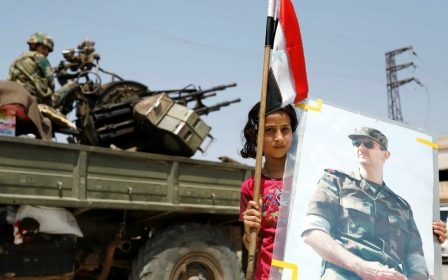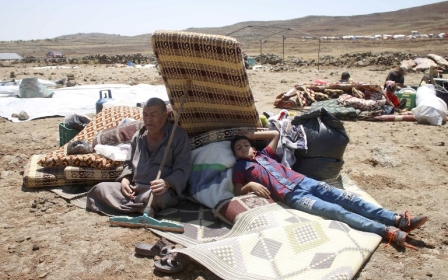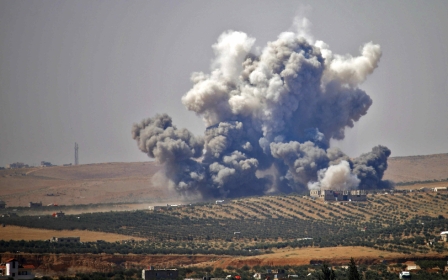Syrians head home in thousands after rebels, government agree ceasefire in south
Thousands of displaced Syrians are heading home after rebels and the government reached a Russian-brokered ceasefire in the south after more than two weeks of fierce bombardment.
Calm reigned over the region on Saturday as the two sides finalised the ceasefire deal, according to the Syrian Observatory for Human Rights, a Britain-based monitoring group.
Under the agreement announced on Friday, opposition fighters will hand over territory in Daraa, a southern province near the Jordanian border.
"People have started to return to their homes since yesterday" from the Jordanian border, Observatory chief Rami Abdel Rahman said on Saturday.
"More than 20,000 people have set off for home so far, heading to areas for which an accord has been reached in the southeastern Daraa countryside," he said.
But others "are scared to return to regime-controlled areas, fearing their children will be arrested," Abdel Rahman said.
More than 150 civilians have been killed in the government bombing campaign on Daraa since 19 June, the Observatory says, and trust in the government does not run high.
Daraa is seen as the cradle of the uprising that sparked Syria's seven-year war, and the government retaking full control of it would be a symbolic victory for President Bashar al-Assad, the AFP news agency reported.
The Russia-backed government offensive in Daraa has displaced more than 320,000 people since 19 June, according to the UN, including tens of thousands who fled south to the sealed border with Jordan.
Jordanian response
Ayman Safadi, Jordan's foreign minister, said in a tweet on Friday that the return of the tens of thousands of displaced Syrians in southern Syria is the kingdom's top priority and he had discussed "practical guarantees" with concerned parties.
"Securing the return of our Syrian brothers to their homes and ensuring their security in their country leads our discussions with all the parties," the tweet read.
"We have discussed practical guarantees to achieve their return," Safadi said, adding it was the international community's responsibility to push for a political settlement of the crisis.
The UN has called on Jordan to open its border.
Jordan, which is already hosting some 650,000 Syrian refugees, has refused so far, citing a combination of security and economic pressures, the Reuters news agency said.
Osama al-Homsi, 26, told AFP he was hesitant to return to his hometown of Jeeza in southeastern Daraa after the deal.
"Of course I support the agreement to stop the fighting and bloodshed," said Homsi, who sought shelter from the bombardment in a field to the south of Daraa city.
"But what is frightening is that it comes with no UN guarantees ... The Russians and the Syrian regime offer no safety," he said.
Only when it is clear the ceasefire has really been implemented and "if we are guaranteed that no one will pursue us, will we want to return," Homsi said.
Friday's deal follows a string of similar accords with rebels for other areas of Syria, which have seen the government retake more than 60 percent of the country, according to the Observatory.
It caps a series of government victories nationwide since Russia intervened in 2015 on Assad's side, including for the former rebel bastion of Eastern Ghouta outside Damascus earlier this year.
Brutal crackdown
Under the accord, rebels are expected to hand over their heavy weapons, while those who reject the agreement will be bussed with their families to opposition-held areas in the north of the country, state media has said.
An Islamic State group affiliate, which holds a small pocket in the southwest of Daraa, is excluded from the deal.
Government forces will also take over "all observation posts along the Syrian-Jordanian border," state media said on Friday, hours after the government regained control of the vital Nassib border crossing with Jordan.
On Saturday, an AFP correspondent saw Syrian army forces and Russian military police deployed at the crossing after more than three years under opposition control.
One of the arches of the key frontier post was damaged, mangled metal wires sprouting from the concrete structure.
The agreement is expected to be implemented in stages, rebel spokesman Hussein Abazeed said, first for eastern Daraa, the provincial capital and then the west of the province.
More than 350,000 people have been killed and millions displaced since Syria's war started in 2011 with a brutal crackdown on anti-government protests.
New MEE newsletter: Jerusalem Dispatch
Sign up to get the latest insights and analysis on Israel-Palestine, alongside Turkey Unpacked and other MEE newsletters
Middle East Eye delivers independent and unrivalled coverage and analysis of the Middle East, North Africa and beyond. To learn more about republishing this content and the associated fees, please fill out this form. More about MEE can be found here.




